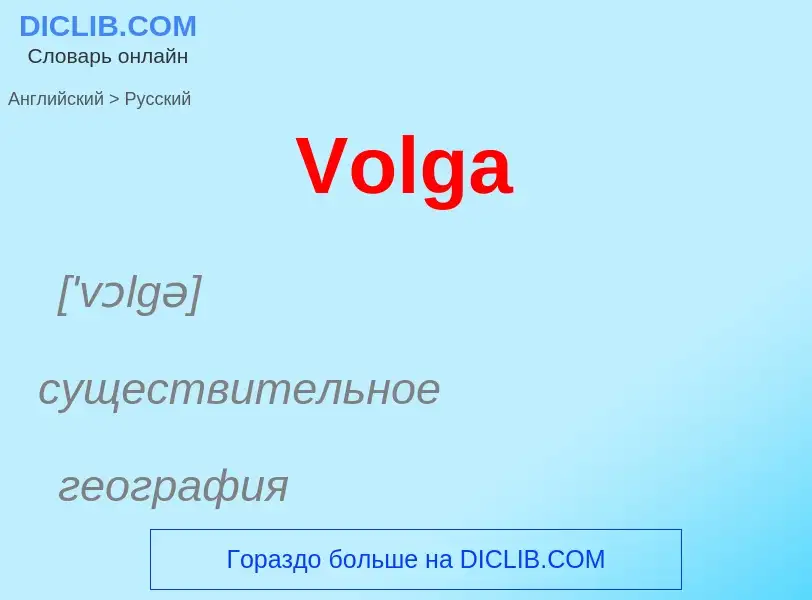Μετάφραση και ανάλυση λέξεων από την τεχνητή νοημοσύνη ChatGPT
Σε αυτήν τη σελίδα μπορείτε να λάβετε μια λεπτομερή ανάλυση μιας λέξης ή μιας φράσης, η οποία δημιουργήθηκε χρησιμοποιώντας το ChatGPT, την καλύτερη τεχνολογία τεχνητής νοημοσύνης μέχρι σήμερα:
- πώς χρησιμοποιείται η λέξη
- συχνότητα χρήσης
- χρησιμοποιείται πιο συχνά στον προφορικό ή γραπτό λόγο
- επιλογές μετάφρασης λέξεων
- παραδείγματα χρήσης (πολλές φράσεις με μετάφραση)
- ετυμολογία
Volga - translation to ρωσικά
['vɔlgə]
существительное
география
р. Волга
общая лексика
бёрш (Stizostedion volgensis)
Βικιπαίδεια

The Volga (; Russian: Во́лга) is the longest river in Europe. Situated in Russia, it flows through Central Russia to Southern Russia and into the Caspian Sea. The Volga has a length of 3,531 km (2,194 mi), and a catchment area of 1,360,000 km2 (530,000 sq mi). It is also Europe's largest river in terms of average discharge at delta – between 8,000 m3/s (280,000 cu ft/s) and 8,500 m3/s (300,000 cu ft/s) – and of drainage basin. It is widely regarded as the national river of Russia. The hypothetical old Russian state, the Rus' Khaganate, arose along the Volga c. 830 AD. Historically, the river served as an important meeting place of various Eurasian civilizations.
The river flows in Russia through forests, forest steppes and steppes. Four of the ten largest cities of Russia, including the nation's capital, Moscow, are located in the Volga's drainage basin.
Some of the largest reservoirs in the world are located along the Volga River. The river has a symbolic meaning in Russian culture – Russian literature and folklore often refer to it as Волга-матушка Volga-Matushka (Mother Volga).


![View of the [[Volga Delta]] from the [[International Space Station]] View of the [[Volga Delta]] from the [[International Space Station]]](https://commons.wikimedia.org/wiki/Special:FilePath/ISS-60 Volga River flowing into the Caspian Sea.jpg?width=200)
![[[Ilya Yefimovich Repin]]'s painting ''[[Barge Haulers on the Volga]]'' [[Ilya Yefimovich Repin]]'s painting ''[[Barge Haulers on the Volga]]''](https://commons.wikimedia.org/wiki/Special:FilePath/Ilia Efimovich Repin (1844-1930) - Volga Boatmen (1870-1873).jpg?width=200)


![river bank]]. river bank]].](https://commons.wikimedia.org/wiki/Special:FilePath/Soviet marines-in the battle of stalingrad volga banks.jpg?width=200)
![Staritsa]], 1912 Staritsa]], 1912](https://commons.wikimedia.org/wiki/Special:FilePath/Staritsa.jpg?width=200)


![Orthodox]] [[shrine]]s and [[monasteries]] are located along the banks of the Volga Orthodox]] [[shrine]]s and [[monasteries]] are located along the banks of the Volga](https://commons.wikimedia.org/wiki/Special:FilePath/Volga River. Tolga Monastery P5212881 2200.jpg?width=200)

![The Volga in the [[Zhiguli Mountains]]. The Volga in the [[Zhiguli Mountains]].](https://commons.wikimedia.org/wiki/Special:FilePath/Вид на Девью гору с Молодецкого кургана.jpg?width=200)
![The [[Saratov Bridge]] by night, [[Saratov Oblast]] The [[Saratov Bridge]] by night, [[Saratov Oblast]]](https://commons.wikimedia.org/wiki/Special:FilePath/Саратовский мост.jpeg?width=200)
![View of the river and [[Volgograd]] from space. View of the river and [[Volgograd]] from space.](https://commons.wikimedia.org/wiki/Special:FilePath/Volgograd 44.67670E 48.66724N.jpg?width=200)
![MODIS]] 2010-07-17. MODIS]] 2010-07-17.](https://commons.wikimedia.org/wiki/Special:FilePath/Volga-river-delta-terra-modis-2010-07-17-750-UTC.jpg?width=200)




